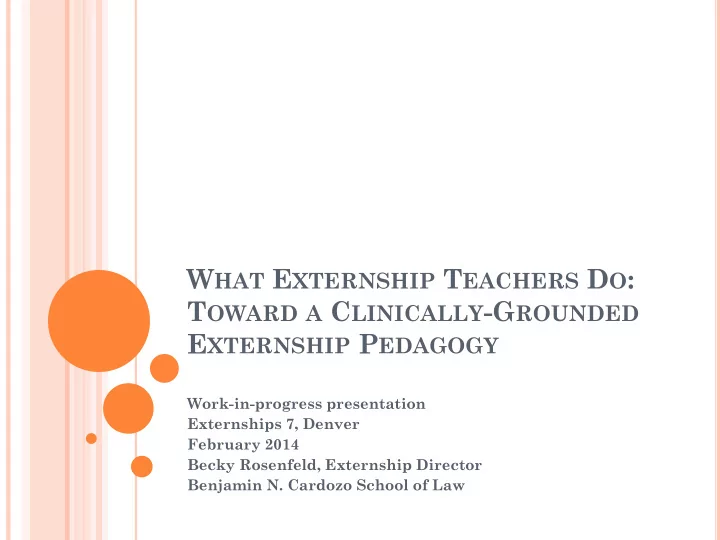

W HAT E XTERNSHIP T EACHERS D O : T OWARD A C LINICALLY -G ROUNDED E XTERNSHIP P EDAGOGY Work-in-progress presentation Externships 7, Denver February 2014 Becky Rosenfeld, Externship Director Benjamin N. Cardozo School of Law
T HESIS We can and should teach the habit of critical self- reflection in externship classes. Teaching tools familiar from the in-house context, such as the use of simulations and the use of rounds/”checking-in,” can help to achieve that goal. More broadly, adding more tools to the experiential teaching toolbox in law schools contributes to the ongoing project of crafting a unique, robust externship pedagogy.
T HREE SECTIONS OF PAPER – TEACHING TOOLS WHICH CAN ELICIT REFLECTION Simulations are an effective method to teach 1. reflection to externship seminar students Simulations are an effective method to teach 2. practitioners (adjuncts) how to teach reflection to externs Checking-in is an effective means to instill the 3. habit of self-reflection with externs
U SING SIMULATIONS TO ELICIT REFLECTION AMONG EXTERNS ? W HAT ?! H OW ?! Identify learning goal – practice a skill, gain insight into a practice area Example – French fashion designer; landlord- tenant dispute Challenges – new to some faculty; in-role can be anxiety-producing; students don’t see as relevant; how to relate lessons to all students Why do it? Effective in bringing about learning and insight; engaging; tie together disparate placements
T EACHING TEACHERS TO TEACH USING SIMULATIONS ? H UH ? Many programs, including Cardozo, use practitioners hired as adjuncts to teach externship classes Cardozo teaching master classes Barriers – do they transfer to classroom? Can practitioners really pull this off? Will they attend trainings? Why do it? Isolates learning as a process aside from substance; exposes practitioners to clinical teaching
U SING “ CHECKING IN ” TO ELICIT REFLECTION ? T ELL ME MORE … Contrasting two teaching methods: (1) Checking in focusing on various issues a particular program deems important (lawyering challenges, institutional critique, access to justice, supervision problems, etc.) vs. (2) checking in with REFLECTION as the focus (my point) (1) Focusing on aspects of lawyering– sharing, reporting, issue-spotting, figuring out next steps, problem-solving around supervision and other problems, presentations, discussion of journals… (2) Focusing on REFLECTION – process of learning, HOW did I learn something, engaging in self-critique
W HAT TYPES OF QUESTIONS MIGHT ELICIT REFLECTION ? What did you learn from what you did? How did you learn from what you did? What do you think enabled you to learn? How did you prepare? Critically assessing one’s own performance – What did I do well? Why did I make that choice? What would I do differently next time? Where do my talents lie? Where do I need to grow?
T ODAY ’ S ROLE PLAY Volunteers -- we’ll act out part of an externship seminar in which students are checking in on their work. You know your student “Harriet,” who’s externing in the immigration unit of a legal services office, was slated to do a client interview last week. Use method #1 – inquire and have Harriet report on her experience – focus on whatever you would do in class, whatever you think is important Use method #2 (focus on reflection): try to get Harriet to engage in some self-reflection about her preparation and performance Prompt: Harriet, how did your client interview go this week?
Q UESTIONS ( AND ANSWERS ?) THIS EXERCISE RAISES Is my thesis comprehensible? What value do you see in trying to elicit self- reflection in externship checking-in? What drawbacks, problems or issues does this teaching method raise? How is checking in on fieldwork done in externship classes in your program? What is the point or goal of it? How well do you think that goal is reached?
Recommend
More recommend